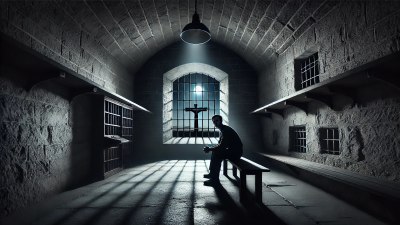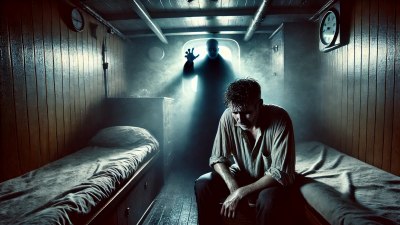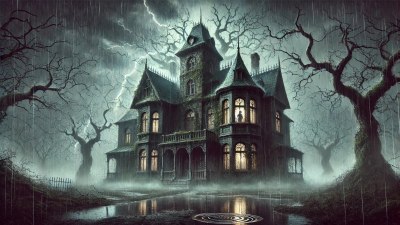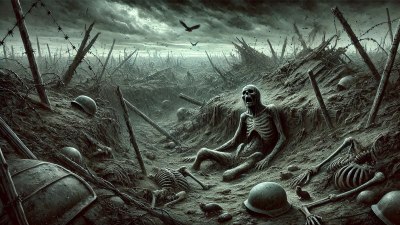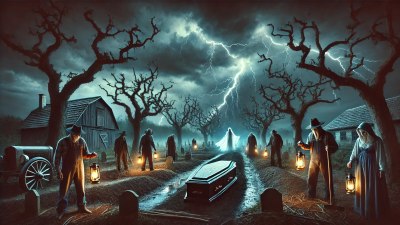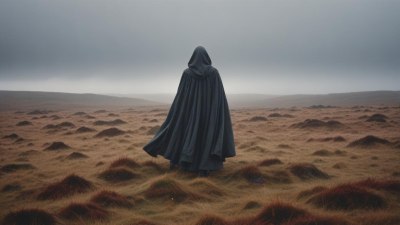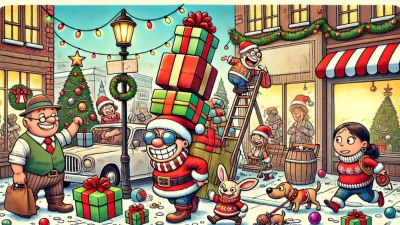The Chain (Noir Thriller)
Quarrier, a private investigator, finds himself in a deadly game of wits after recovering incriminating documents against a powerful corporate criminal. Following a kidnapping attempt and a daring escape, Quarrier discovers his office breached...
 Hamilton Craigie
Hamilton Craigie 
This image was created with the assistance of DALL·E
I.
TROUBLE.
Quarrier entered the taxi with an uneasy sense of crisis.
He was not imaginative; his digestion was excellent; even at forty, an age when most men nowadays have begun to feel the strain of fierce business competition, Quarrier was almost the man that he had been ten years in the past.
Nerves and Quarrier were strangers; he smoked his after-dinner cigar in a rigorous self-denial that made it his sole dissipation; he was in bed and asleep when other men were comfortably faring forth in search of such diversion as the metropolis had to offer.
But the face of that taxi-driver--he had seen it somewhere before. It was a dark, Italian face, with high cheekbones, and a straight, cruel mouth, like a wedge, between lean cheeks scarred and scabbed with late-healed cicatrices and pocked blue with powder burns.
Not an inviting face. And the taxi was old. Glancing at the cushions, as they had roared past an arc-light at the street corner, Quarrier had thought to see the dingy leather sown thick with stains, broad patches, as if--as if....
But pshaw! As he told himself, he was getting fanciful; perhaps his liver, at last, had played him false. A migraine, doubtless--he’d have a look in on old Peterby in the morning. Peterby was a good, plain old-fashioned practitioner--no nonsense about him....
He had gone to the offices of the Intervale Steel Company on a mission, an important one. As a matter of fact, it was vital--almost a matter of life and death. But he smiled grimly now in the dark recesses of the cab as he reflected that, as it chanced, his last-minute decision had left those documents where they would be beyond the reach of--Hubert Marston, for instance.
He had nothing on his person of any special value; he would be poor picking, indeed, if, as it chanced, that taxi-driver with the face of a bravo might, behind the sinister mask that was his face, be the thug he seemed, hired, perhaps, by the Panther of Peacock Alley.
An extravagant appellation, doubtless, but that was Marston: Suave, sinister, debonair--the social roturier equally with the manipulator. He had acquired the name naturally enough, for most of his operations were carried on in the hotels and clubs.
He had an office hard by the “Alley” and it was from its ornate splendor that he issued, on occasion, gardenia in buttonhole, cane hooked over his arm, dark face with its inscrutable smile flashing upon the habitués with what meaning only he could say. And he did not choose to tell.
And Marston had wanted those documents; they spelled the difference to him between durance and liberty--aye, between life and death....
For Hubert Marston had made the one slip that, soon or late, the most careful criminal makes: He had, yielding on a sudden to his one rare impulse of hate, commissioned the murder of a man who stood in his way, and--he had paid for it, as he had thought, in good crisp treasury notes, honest as the day, certainly! But the payment had been made at second--or third-hand--that was Marston’s way. And for once it had betrayed him.
For those documents--as he had found out, too late--were counterfeit treasury notes. The go-between had seen to that, paying the hired killer with them, and pocketing the genuine. And Quarrier, himself the watch-dog of those interests that Marston would have despoiled, (he had been retained by them for some time now as their private investigator) had found, first, the disgruntled bravo himself, obtained the spurious notes, together with the man’s confession, traced them backward to the go-between--and now, hard upon the arch-criminal’s heels, he waited only for the morning, and that which would follow.
Quarrier had given the driver a number in the West Eighties, but now, glancing from the window, his eyes narrowed with a sudden, swift concern.
“The devil!” he ejaculated, under his breath. “Now, if I thought--”
But the sentence was never completed. They were in a narrow, unfamiliar street; a street silent, tenantless, as it seemed, save for dark doorways, and here and there a furtive, drifting shadow-shape--the tall fronts of warehouses, with blind eyes to the night, silent, grim.
The echoing roar of the engine beat in a swift clamor against those iron walls--and suddenly, with a sort of click, he remembered where it was he had seen that lupine countenance--the dark face of the driver separated from him by the width of a single pane of glass.
It had been behind glass that he had seen it. A month or so previous, at the invitation of his friend, Gregory Vinson, captain of detectives (with whom he had formerly been associated, prior to his present connection), he had visited headquarters; and it had been there, in the gallery which is given over to rogues, that he had marked that face, its features, even among the many crooks, thugs, strong-arm men, yeggs, hoisters, pennyweighters, housemen, and scratchers. And now he remembered it when it was too late!
His right hand falling upon the butt of a blunt-nosed automatic, with which he was never without, with his left he jerked strongly at the handle of the door. But the door was locked; he could not open it.
Quarrier had been in a tight place more than once; danger he was not unacquainted with; it had been with him in broad daylight, in darkness, grinning at his elbow with dirk or pistol in the highways and byways of Criminopolis. He was a fighter--or he would not have won to the possession of those documents--the documents so greatly desired by Hubert Marston--the evidence of the one false step made by the Master of Chicane, the one slip that was to put him, ere the setting of another sun, where he would be safe.
Now Quarrier, his mouth a grim line, was reaching with the butt of his automatic to break that glass when, with a grinding of brakes the taxi whirled suddenly to a groaning halt.
The door swung open--to the windy night without, and the glimmer of a dark face at the curb.
“Here you are, sir,” Quarrier heard the voice, with, he was certain, a mocking quality in the quasi-deferential cadence. But he could see merely the face, behind it a black well of darkness, velvet black, save for the dim loom of a lofty building just across.
Quarrier did not know how many there might be, lurking there in the blackness, nor did he greatly care. The locked door; the face of the man at the wheel; the unfamiliar street--shanghaied by a land pirate, at the very least! There could be no doubt of it.
But it was no time for hesitation. If he were in the wrong, and it was all a mistake--well, he could afford to pay. But--the face of Marston arose before him, suave, sinister, smiling.... What was it the man had said, on the occasion of their last meeting at the Intervale offices:
“Possession, my dear Quarrier--possession is ten points of the lawless. Remember that!”
Quarrier remembered, and with the remembrance came a swift, sudden anger. But it was an anger that was controlled, as a flame is controlled--though it was none the less deadly.
“Here you are, sir,” repeated the voice, and now there was in it a something more than mockery. There was an edge, a rasp; almost it sounded like a command, an order.
Quarrier grinned then--a mere facial contraction of the lips. Then, muscle and mind and body, in one furious projectile, he launched himself outward through the doorway in a diving tackle.
The white face with its sneering grin was blotted out; there came the spank of a clean-cut blow; a turgid oath. Quarrier, rising from his knees, surveyed the limp figure on the cobbles with a twisted smile; then he turned, peering under his hand down a long tunnel of gloom, where, at the far end, a light showed, like a will-o-the-wisp beckoning him on.
He could not tell where he was. Somewhere in the Forties, he judged--Hell’s Kitchen, probably--although there was a curious lack of the life and movement boiling to full tide in that grim neighborhood of battle, murder, and sudden death.
But as his eyes became accustomed to the stifling dark he found the reason. It was a street of warehouses, public stores; and further on, as he looked, like a ribbon of pale flame against the violet sky, he saw the river.
He bent his steps away from it, walking carefully, picking his way on the uneven flagging. Twice, as he went forward, it seemed to him that he was watched--that eyes gazed at him out of the blackness; and twice he turned his head, swiftly to face the silence and the emptiness of the long, lonely way.
And it seemed, too, that as he went, the whispering echo of his hasty steps went on before him, and behind; he fell to counting them--and suddenly he knew. They were before him--and behind. He was in a trap.
There came a leaping, thunderous rush at his back, and a voice, screaming between the high walls:
“There he is! Now--go get ’im!”
And it was then that Quarrier, reaching for his pistol, discovered that it was gone; lost, doubtless, in that encounter with the taxi-driver. But he braced, spreading his arms wide as a grizzly meets the onslaught of wolves. But the wolves were many, and they came on now, a ravening pack; one, before the rest, looming as a black blot against the starshine, lunged forward with a growling oath.
The rest were yet some little distance away. Quarrier saw the man, or, rather, he sensed the nearness of that leaning shadow, spread-eagled like a bat against the dimness.... Then there came the sudden impact of fist on flesh--a straining heave--and Quarrier, diving under the hurtling figure, straightened, and hurled him outward and away.
The flying figure struck among the rest, head on, to a growling chorus of oaths, imprecations. But still they came on, thrusting, lunging; a gun crashed almost in Quarrier’s face.... There came a voice:
“No shooting, you fool! Th’ Big Gun says--”
The rest was lost as the pistol clattered to the cobbles. The center of a whirling tangle of fist and foot, to Quarrier it seemed that he fought in a nightmare that would have no end. He had gone to one knee under the impact of a swinging blow, when, from the far distance, there sounded the rolling rattle of a night-stick, with the clangor of the patrol.
Something gripped his ankle--something at once soft and hard. He lunged, full length, as a football player at the last desperate urge of his spent strength. Then he was on his feet, running, side-stepping, circling with the skill and desperate effort of a plunging half-back, stiff-arming the opposition to right and left.
Just ahead, the black maw of an alley, a deeper blot of blackness, loomed. In its heart, like a witch-fire, there swam upward a nebulous, faint glow as from the pit; out of the tail of his eye he saw it: The dim loom of a house, and an open door.
He reached the turn--and a figure uprose before him, even in that darkness brutish, broad, thewed like a grizzly. The great arm rose, once; it fell, like the hammer of Thor.
Quarrier lurched, stiffened, buckling inward at the knees in a loose-jointed, slumping fall.
II.
Hangman’s Hold.
Quarrier came to himself, all his faculties at full tide.
It was smothering dark--a darkness not merely of the night but of a prison-house, silent, musty with the stale odor of decay and death. Near at hand, after a moment, he heard a slow, ceaseless dripping, like the beating of a heart, or the slow drip-drip of a life that was running out, drop by single drop.
The fancy seemed logical enough; there seemed nothing of the fantastic in it; Quarrier waited, there in the smothering dark, for the quick knife-thrust that would mean the end--or the deadening impact of the slung-shot.
But, unimaginative as he was, like a man who has but lately undergone the surgeon’s scalpel he feared to move, to feel, even while he assured himself that he was unhurt save for the throbbing in his temples, and the very bruises that he felt upon him, but would not touch.
But there was something else. After a little his hesitant, exploring fingers found it. The length of line bent in a sort of running bowline about his shoulders and arms. And behind him, from a staple in the wall, it hung, sliding like a snake in the thick darkness.
He moved his head, slowly, carefully, like a man testing himself for an invisible hurt. And then--
“Ha!” he breathed, deep in his throat, the shadow of a cry. For, moving an inch further to the right, it would have been a noose, tightening as he moved, strangling him there, choking him out of sound and sense.
Brave as he was, Quarrier shivered, his shoulders twitching with the thought. And it was not cold. Moving with an infinite caution, he ran his exploring fingers along the hempen strands.
Whoever had devised that noose had been a sailor. And only a sailor could undo it.
And there in the dark, trussed as he was, at the mercy of what other peril he knew not. Quarrier permitted himself the ghost of a grin. His hand went up, slowly, carefully, the fingers busy with the rope; there came a tug, and, coiling at his feet like a snake, the noose slid slithering along the stones.
Quarrier was not a praying man, in the ordinary sense, but now he sent heavenward a silent aspiration of gratitude for the impulse which, years previous, had prompted his signing on as a foremast hand in the China seas. And the long hours in the doldrums, below the line, had, as it proved, been anything but wasted.
Now, easing his cramped muscles in a preliminary stretching, he rose gingerly to his feet, moving with the stealth and caution of an Indian. He was free of that constricting rope, but as he moved forward, groping, just ahead there came to him a sudden murmur of voices, low, like the growling of savage beasts. There was that sort of note in it: A fierce, avid mutter, and presently, as he advanced, he made out here and there a word.
“Th’ Big Gun.... You better watch your step.... Mar--”
Quarrier found himself in a sort of corridor, at the far end of which proceeded the voices. It had all been done in the dark, so to speak. The taxi, that driver with the face familiar and yet unfamiliar, the attack, and now this. But time pressed. Why they had not murdered him out of hand he did not pause to consider; he knew only that Marston--and he was certain that it was Marston’s hand that had been in it--would, with a clear field, be at the hiding-place of those documents. Even now, doubtless, he was there.
Quarrier felt mechanically for his pistol; and then his hand dropped hopelessly as he remembered that he was weaponless.
He listened tensely, holding his breath, as the voices receded--or, rather, one of them; he could hear the other following the departing man with his complaints.
Evidently they had left a guard of two. One of them was going; the other left behind, and not especially delighted with his job.
An abrupt turn of the long hallway brought this man suddenly into plain view.
Quarrier blinked in the glare from the single incandescent, flattening himself against the wall; then, with a pantherish pace, he had covered the intervening space in three lunging strides.
The man, a broad fellow with a seamed, lead-colored countenance, turned his head; his mouth opened, his hand going to his pocket with a lightning stab of the blunt, hairy fingers.
But Quarrier had wasted no time. Even as the giant reached for his gun Quarrier’s fist swung in a short arc, and there was power in it. The blow, traveling a scant six inches, crashed full on the point; the thick-set man, his eyes glazing, swayed, slipped, fell in an aimless huddle.
“Well--a knockout!” panted Quarrier, reaching for the pistol.
Marston was the “Big Gun”, of course. Quarrier had never doubted it; but hitherto the President of Intervale Steel had conducted his brokerage business, on the surface at any rate, without resort to open violence. And Intervale Steel--You knew really nothing about it until you took a flyer in it; then, as it might chance, you knew enough and more than enough.
Quarrier, glancing at the unconscious man and pocketing the pistol, departed without more ado; proceeding along the hall, he found, with no further adventure, a narrow door, and the pale stars, winking at him from, he judged, a midnight horizon.
But a glance at his watch told him that it was but nine-thirty; there was yet time to get to the hiding-place of those documents ahead of Marston, if, as he was now convinced, it had been Marston’s thugs who had ambushed him.
Plunging along the shadowy alley, after five minutes’ walk, made at a racing gait, he found a main-traveled avenue and an owl taxi, whose driver, leaning outward, crooked a finger in invitation to this obvious fare, appearing out of the dark.
Quarrier did not hesitate. The fellow might be a gunman or worse; he must take his chance of that.
“Twenty-three Jones!” he called crisply, with the words diving into the cab’s interior; then, his head out of the window, as the taxi turned outward from the curb:
“And drive as if all hell were after you!”
III.
The Shape Invisible.
Quarrier reached his destination without incident, but as he went up the winding stairway of the office building to his private sanctum he was oppressed by an uneasy sense that all was not as it should be. Those elevators--they were seldom out of order. Perhaps....
But, panting a little from his climb, he found his floor, and the door of his private office.
For just a split second he hesitated; then, unlocking the door, he flung it wide and went in.
And then, for the third time that evening, he had another shock: for, almost from the moment of his entry into that sound-proof chamber, he knew that he was not alone.
For a moment, there in the blaze from the electrolier, lighted by the opening of the door, he stood rigid, listening, holding his breath; crouched, bent forward like a sprinter upon his mark.
Quarrier was a big man, and well muscled; in his day he had been an amateur boxer of repute. For a big man, he was quick, well-poised, supple and controlled.
A brain of ice and nerves of steel--that was Quarrier. And at that moment he stood in need of them.
He had heard nothing, felt nothing, seen nobody--and yet he knew, beyond any possibility of doubt, that someone or something was with him there in that sound-proof chamber, thirty stories above the street. And the knowledge--as certain as the fact that he, Quarrier, as yet lived and breathed--the knowledge that he was not alone was not reassuring. It was fantastic, it was incredible--but it was true!
Everything in that private office was in plain sight; shelter there was none for any possible intruder; and yet, by the very positive evidence of his eyes he knew, and his pulses quickened at the thought, that he was not alone.
It had been Quarrier’s fancy to rent the small suite on the top floor of the out-of-the-way office building. He liked the view; the rooms were remote; they suited his purpose; they were private. Anything could happen here, and no one be the wiser: the crash of a heavy .45, for instance, would not penetrate an inch outward beyond those sound-proof walls. And a cry, a shout would be lost there just as a stone is lost, dropped downward into a deep well of silence--and of oblivion.
Now, if Quarrier’s man, Harrison, a soft-footed, super-efficient body-servant, had not kept on his hat; or if, say, he had not had a particularly abundant shock of hair, added to the fact that although an excellent servant, he was somewhat deaf; and if, too, he had not, for once, walked and worked in deviousness--this chronicle would have had a very different ending--for Quarrier, at any rate.
His hand in the pocket of his coat, the fingers curled about the butt of the automatic that he had taken from the guard back there in the cellar, Quarrier, frowning, surveyed the room in a slow, searching appraisal. Those documents--he had to make certain of them.
From left to right, as his gaze went round the chamber, he saw a book-case, a full-length canvas, done in oils, the double windows, a door, locked with a huge, old-fashioned key, leading into a lumber-room just beyond, a small wall safe, his desk--which completed the circle.
The room was in itself a safe. It was like a fort: The windows were protected by sheet-steel aprons similar to the burglar-guards used by bank tellers; the main entrance door, through which Quarrier had entered, and which opened upon the corridor and the elevators, was of steel, with a patent spring combination lock; the other door, leading to the lumber-room, was also of steel, locked, however, with a huge, old-fashioned key, but this latter door had never been in use since Quarrier’s occupancy.
Nothing short of an acetylene blowpipe could have penetrated the walls, the ceiling, the floor, but they were smooth, unmarred by scratch or tell-tale stain.
Now, to understand events as they occurred:
Quarrier was in his private sanctum, his office; it adjoined the lumber-room at the right. And a simple diagram may serve perhaps better than a page of explanation:
The electrolier, blazing from its four nitro lamps, illumined every nook and cranny of that office; shed its blazing effulgence upon Quarrier, standing like a graven image before that wall safe. And as he stood there, for the first time in his well-ordered existence a prey to fear, a face rose out of his consciousness; he heard again the voice of Marston, President of Intervale Steel:
“You have them, my dear Quarrier; keep them--safe.”
Quarrier had never liked Marston; the man was elusive, like an eel; you never saw his hand: it was impossible to guess what moved behind the mask-like marble of his face, expressionless always, cold, contained.
But Quarrier had the “documents,” or, rather, they were there, in that wall safe, in itself a small fort of chrome-nickel steel and manganese against which no mere “can-opener” could have prevailed--no torch, even.
Now, as he operated the combination, he was abruptly sensible of a curious sensation of strain; a shock; the short hairs at the back of his neck prickled suddenly as if at the touch of an invisible, icy finger. And for a moment he could have sworn to a Presence just behind him--a something in ambush grinning at his back--a danger, a real and daunting peril, the greater that it was unmeasured and unknown.
But with his fingers upon that dial, Quarrier half turned as if to depart. He was getting jumpy, his nerves out of hand--too much coffee and too many strong cigars, perhaps. That was it. That kidnapping; it might, after all, have had nothing to do with Marston. The documents were safe--they simply had to be. Unless Marston had been there, and gone; but he would scarcely have had time.
Perhaps, too, Quarrier might have obeyed the impulsion of that turning movement, and in that case, also, this story would never have been written. Quarrier might have done this, but for the moment, practical and sanely balanced as he was, for a split second he had the fancy that if he turned his head he would see--something that was not good, that was not--well--normal.
It was instinctive, elemental, rather than rational, and, getting himself in hand, he would, doubtless, have turned abruptly, leaving the room, if, at that moment, out of the tail of his eye, he had not seen the inescapable evidence of a presence other than his own.
IV.
The Silent Witness.
Quarrier was a large man, and hard-muscled, a dangerous adversary in a rough-and-tumble, a “good man with his hands,” as we have seen; young, and a quick thinker.
In the half of a second it came to him that Marston might have delegated his authority (at second- or third-hand, certainly) to some peterman, some yegg, say, to obtain possession of those documents. But the fellow would have to be a boxman par excellence; that strong-box was the last word in safes, and, Quarrier was certain, the final one.
No ordinary houseman could hope to break into it, and the marauder would have to depend upon a finger sandpapered to the quick, hearing microscopically sensitive, to catch, through that barrier of steel and bronze, the whispering fall of those super-tumblers.
And abruptly following this suggestion, a second and a more daunting thought obtruded: Suppose--just suppose, that their design held no intention of an assault upon the safe; suppose that their plan, the purpose of that nameless, invisible Presence, had included, in the first place, him--Quarrier? In case, after all, he had managed to escape the trap back there in the cellar? Why--they would use him; that was it! They would force him to open the safe. The thing was simple; there was about it, even, a suggestion of sardonic humor, but it was a humor that did not appeal to Quarrier.
Upon the instant he swung round, crouching, his hand reaching for his pocket in a lightning stab, and coming up, level, holding the short-barrelled automatic.
Then his mouth twisted in a mirthless grin as his straining gaze beheld the square room empty under the lights.
A moment he stood, his keen, strong, thoughtful face etched deep with new lines of worry, ears strained against the singing silence, eyes turning from door to door, and from wall to window, a pulse in his temple throbbing jerkily to his hard-held breath. He began the circuit of the room. Walking on tiptoe, he approached the door by which he had entered, thrust into its socket the great bolt. The bolt seemed really unnecessary; the lock in itself, a spring-latch affair, was devised so that it held the stronger for pressure from without.
The snick of steel against steel rang startlingly loud in the speaking stillness; for a moment Quarrier had a curious fancy, a premonition almost, that it was a wasted precaution--that, in effect, he was locking and double locking that door upon an empty room--an empty strong-box. Pistol in hand, however, and starting from the door, he began his round.
The book-case he passed with a cursory examination; nothing there. Next the painting; a portrait of his great-uncle; it held him for a moment; those eyes had always held him; they were “following” eyes; and now for a moment it seemed to Quarrier that they held a warning, a message, a command. But he passed on....
A heavy leather settle was next in order. With a sheepish grimace he stooped, peering under it, straightened, going on to the double windows. That settle had been innocent of guile, but as to the windows--he paused an interval while he thumbed the patent steel catches. These were shut tight, the windows black, glimmering squares against the windy night without.
Throwing off the locks, one after the other, he pushed up the first window, released the steel outer apron, and then, in the very act of leaning outward into the black well beneath, he drew back, with a quick, darting glance over his shoulder as his spine prickled at a sudden, daunting thought.
What was that?
For a heartbeat at his back he thought to hear a rustle, a movement, like the shuffle of a swift, stealthy footfall, on the heavy pile of the Kermanshah rug.
But once more there was nothing--no one.
It was thirty stories to the street beneath, and as he leaned there in the window his imagination upon the instant had swayed out down to the dreadful peril of the sheer, sickening fall.
How simple it would have been for someone behind him--how easy....
He shivered, the sweat beading his forehead in a fine mist of fear. A hand on his ankle--a quick heave--and then a formless blur against the night--the plunge--into nothingness....
Turning to the right, he surveyed the heavy door leading to the lumber-room. He tried the great key, rattling the knob. The door was locked; it was heavy, solid, substantial. A quick frown wrinkled his forehead.
“Absurd!” he muttered, but there was an odd lack of conviction in the word. “Impossible!” he said again. “There’s nobody in the room except myself; there couldn’t be.”
But even as he spoke he knew, beyond the shadow of a doubt, that someone or something had occupied that room but a matter of seconds prior to his entry, and if he, or whatever it was, was not there now, where was this invisible presence?
The presence in the room of another than himself was a physical impossibility unless, indeed, there was, after all, a fourth dimension, into which as a man passes from sunlight into shadow, the intruder had stepped, perhaps now regarding him sardonically from that invisible plane: A living ghost!
Absurd! And yet, there was that other fact--he had seen it: the silent, the voiceless, yet moving witness--the positive and irrefutable proof of a presence other than his own.
*
There, in a locked, bolted, impregnable chamber, unmarked by the least sign of entry--a main door which did not have a key, responding only to a combination known only to himself--a secondary door most obviously locked, and from the inside; windows of thick glass, triple locked with the latest in patent catches--someone or something had entered, passing, as it seemed, through bolts and bars, through walls, through steel and stone and concrete, like a djinn, or a wraith--through the keyhole?
Matter-of-fact as he was, hard-headed and practical, Quarrier was aware for an instant of a flicker of almost superstitious fear. But--rot! In all the space confined by those four walls and ceiling and floor there was not room for concealment even for a--cat, for instance--for nothing human, at any rate. It was beyond him, even as the Thing that had entered was beyond him, though at hand.
Quarrier did not believe in the supernatural with his mind; but, brave as he was by nature and training, in that moment he knew fear. But he preferred, with his intelligence, to credit Marston with it; Marston, so far as morals were considered, might have been almost anything: you saw it in his curious eyes, with their pale irises, the flat, dead color of his skin, like the belly of a snake; in the grim, traplike mouth. Quarrier had never deceived himself as to the President of Intervale Steel. The thing was fantastic, unreal--and yet. It might easily be a trap, and worse. Peril, the more subtile because unknown, was all about him; he felt it, like an emanation. What was it that the psychological sharps would call it? An aura, as of some invisible and deadly presence, seeing, although unseen.
V.
Through The Keyhole.
The room, or office, as has been written, was impregnable to any but an assault in force, the doors invincible save by the shattering crash of high explosive, the windows almost equally so.
Quarrier’s man, Harrison, even, would be unable to enter the room in his employer’s absence; so that, knowing the combination of the safe, he could take nothing from it, or bring anything into it. He left, in the rare intervals that Quarrier suffered his ministrations, always with his master, returning likewise, if he returned at all, in Quarrier’s company.
The recluse had hedged himself about with care. Marston, with his keen, devising brain, would face a pretty problem in the recovery of those documents.
But it was when, on an abrupt inspiration, Quarrier removed the telephone receiver from its hook, that he became certain that it was a trap.
“Give me Schuyler 9000,” he had whispered, his voice hoarse in the blanketing silence. But even with the words he knew that the line was dead, yet it was characteristic of Quarrier that, once satisfied that this was so, he resumed his inventory of the office where he had left off.
He had completed the circuit of the chamber with the exception of the wall safe and the small, flat-topped writing-desk by the door. From his position he could see the desk quite easily; there was nothing and nobody either on or under it. And now, before he twirled the combination, he laid his hand upon the doors, pulling at the handles in a perfunctory testing. And then--
He recoiled, stumbling backward, as the doors swung wide with a jarring clang. Fingers trembling, he jerked forward a drawer--put in his hand. He withdrew it--empty. Confronted with the incredible truth--the thing which he had feared and yet had not believed--he stood, stunned. For the documents had vanished!
Even in the midst of his excitement and dismay, Quarrier permitted himself the ghost of a faint, wintry grin. But a few hours before he had himself bestowed those papers in their particular resting-place, and, observing a precaution to make assurance doubly sure, he had stationed a guard at the street level, men whom he could trust. For, in the morning he had meant to transfer those documents to that repository in the West Eighties from which Marston would never be able to retrieve them, for with their receipt would come the final quietus of the President of Intervale Steel. And that was why Quarrier had called that number, which had not answered.
Now the documents were gone and Marston was safe. But there remained a final thin thread of hope, and it was this:
The building, a new one, stood alone; Quarrier owned it; his enemies had in some obscure fashion obtained that which they sought. And--this being so--they were in the building.
Quarrier’s orders to that guard had not included the stoppage or detention of any seeking ingress. On entering, he had been informed merely that perhaps half a dozen, all told, had possibly preceded him. They had trapped him--perhaps they might even succeed in expunging him from the record together with the evidence, but they--Marston and the rest--some or all of them were in the building; they had to be.
He grinned again, a swift, tigerish grin, as he considered the trifling clue which had betrayed them. But for that he would never have discovered the looting of the safe.
And it was then, as he stood, turned a little from the safe and facing the heavy door giving on the lumber-room, that he straightened, tense, bending to the keyhole.
The door was sound-proof, as were the walls, but abruptly, as a sound heard in dreams, he had heard it: At the keyhole, a sound, or the shadow of a sound, faint and thin, but unmistakable, like the beating of a heart.
And that sound had gone on, faint and thin, as though muffled through layers of cotton wool, persistent, regular--the faint, scarce-audible ticking of a watch.
For a moment, even while he considered and dismissed the thought that they might have planted a time-bomb against that door, Quarrier hesitated. And then, abruptly, he knew: They were in the lumber-room; he had surprised them; doubtless they waited, hidden, for his exit. He had been too quick for them; they had not counted on his escape from that cellar, and if that were so, he, Quarrier, would have something to say as to their getaway.
Silent, his automatic ready, he had opened the door into the corridor with a slow, stealthy caution. Then he was in the corridor, searching the thick-piled shadows, where, at the far end, a light hung between floor and ceiling like a star. A silence held, thick, heavy, mournful, daunting, as he began his advance--a silence burdened with a tide of threat, sinister, whispering, alive.
Just ahead of him was the first of the great batteries of elevators. A pressure upon the call-bell, and in a moment he would have with him men upon whom he could rely, men who would execute his least order without question. And then, remembering, he desisted.
For he found it easy to believe that the same agency which had silenced his telephone might have cut him off here also from communication, but his finger, reaching for the signal, jerked backward, as, out of the corner of his eye, he beheld a lance of light spring suddenly from the crusted transom of the lumber-room door.
Were they coming out?
“Ha!” he breathed, deep in his throat.
He did not pause to consider how many of them there might be, or that his faithful guardians of the gate, thirty stories below, were probably silenced by the same sinister hand.
Silently, his gun held rigid as a rock, he approached the lumber-room door; then, a step away, he paused, with a sharp intake of his breath.
Here, six paces at his left, a narrow corridor led to a fire-alarm box and a window directly overlooking the main entrance and the street. Quarrier, back to the wall, thrust up a groping hand to where, just above his head, a light cluster hung. Three of the bulbs he unscrewed; then, going to the window, opened it, leaned outward, and, with intervals between, dropped them downward into the dark.
Then, pistol in hand, his feet silent upon the concrete flooring of the corridor, he approached the lumber-room door.
On hands and knees, he listened a moment at the keyhole; then, still on his knees, his fingers, reaching, turned the knob, slowly, with an infinite caution, in his face new creases, grim lines. His face bitter, bleak, mouth hard, he straightened, got to his feet, thrust inward the heavy door with one lightning movement; stepped into the lumber-room, his gun, swung in a short arc, covering the two who faced him across the intervening space.
“Those documents, Marston,” he commanded bruskly, “I can--use them.”
His gaze, for a fleeting instant, turned to the other man, who, hands clenched at his sides, his eyes wide with sudden terror and unbelief, stared dumbly at the apparition in the doorway.
But Marston, his face gray, his hand hidden in his pocket, shrugged, sneered wryly, his hand thrust out and upward with the speed of light.
But, for the difference between time and eternity, he was not quick enough. There came a double report, roaring almost as one: Marston’s sneer blurred to a stiff, frozen grimace; he swayed, leaning forward, his face abruptly blank; then, in a slumping fall, he crashed downward to the floor.
Quarrier stooped, swept up the papers where they had fallen from the dead man’s pocket; then he turned curtly upon his body-servant.
“You may go, Harrison,” he said, as if dismissing the man casually at the end of his day’s service.
But if Harrison felt any gratitude for the implied reprieve, he turned now to Quarrier with an eager gesture, his speech broken, agonized:
“He--you must listen, sir--Mr. Quarrier,” he begged. “He--Mr. Marston--he knew me when--he knew about....”
His voice broke, faltered.
“Well--?” asked Quarrier, coldly, his face expressionless.
“Mr. Marston,” continued the man--“he knew--my record--I was afraid to tell you, sir. He--he found out, somehow, that I’d--been--done time, sir.... He scared me, I’ll admit--he threatened me--threatened to tell you.... You didn’t know, of course....”
“Yes--I knew,” explained Quarrier, simply, and at the expression in his master’s face the valet’s own glowed suddenly as if lighted from within.
“You--knew--” he murmured.
VI.
Chain of Circumstance.
“But there is one thing you can tell me,” Quarrier was saying. “You had the combination of the safe, of course; we’ll say nothing more about that--but--how did you get in?”
Harrison bent his head.
“Well, sir,” he explained, after a moment, “it was simple, but I’d never have thought of it but for--him.” He pointed to the silent figure on the floor.
“Well--there are just three doors, sir, as you know,” he resumed. “The entrance door of your office, with the combination lock; the entrance door of the lumber-room here, both giving on the corridor; and the inside door between the lumber-room and your office. We couldn’t get into the office by the entrance door from the hall on account of the combination lock, but we could and did get into the lumber-room easily enough from the corridor--the door’s not even locked, as you know, sir. And that’s how we got into the private office--from the lumber-room, here, through the door between.”
“But how--?” began Quarrier. “That door is a steel one; it was locked--I’ll swear to that. You didn’t jimmy it; you didn’t have a Fourth Dimension handy, did you, Harrison? But--go on; it’s beyond me, I’ll confess.”
Harrison permitted himself the ghost of a grin.
“Why--just a newspaper, and a bit of wire, sir--that was how it was done. I didn’t dare unlock the connecting door--beforehand, sir--from the office side; I never had the chance. I was never alone in the office, sir, even for a second, as you know; but there’s a clearance of nearly half an inch, sir, beneath that connecting door--just enough for the newspaper. From the lumber-room here I pushed the paper under the door, into the office, and then, with the wire, it wasn’t so difficult to push the key out of the lock; the door was locked from the office side, of course.
“The key fell on the paper; we pulled the paper with the key on it back under the door, sir, into the lumber-room here, and--we just unlocked the connecting door there, and walked into the office. Afterwards I locked the door again, from the office side, and I just did make it out the front door of the office, when I heard your step on the stair. He was waiting for me in the lumber-room; he said it was safer. Anyway, I just did make it along the hall and into the lumber-room by the hall entrance before you came.”
He paused, a queer expression in his face.
“But I don’t understand how you knew, if you’ll excuse me, sir--how you suspected. Afterward, from the corridor, you saw our light when we were ready to come out; we thought you’d gone for good, of course.... But nothing was touched, sir, except--that is--of course--” He stumbled.
Quarrier silenced him with upraised hand.
“I didn’t suspect, Harrison--I knew,” he said. “And I heard, through the keyhole of that connecting door, the ticking of that watch of yours; it’s big enough. That helped, of course. But that was afterward. There was one little thing you overlooked, and, for the matter of that, so did I--nearly.”
There came the sound of heavy footsteps on the concrete flooring of the corridor, voices: His guards, summoned by Quarrier’s “light-bombs.”
Quarrier continued, as if he had not heard:
“Well--it was right under my eyes, but I almost missed it, at that. I saw it moving, and I knew that something must have made it move.”
He paused, with a faint grimace of recollection.
“You see--you had your hat on in the office, didn’t you?... Yes, I thought so. You’re a bit deaf, too.... Well, you should have been--to Marston. But that’s past. And you have a good, thick crop of hair--so far.”
Quarrier smiled frostily. “Well, you struck against it and set it moving--that was all. You never noticed it. Because it was--the chain from the electrolier, Harrison, and that was how--”
“You caught us, sir! I--I’m glad. You might call it a--”
“--Chain of circumstance,” finished Quarrier, his eyes outward, gazing into the new dawn.
🙃
This story is part of "Weird Tales, Volume 1, Number 1, March 1923: The unique magazine" edited by Edwin Baird. Read all the stories from this enchanting collection here >>> Weird Tales!
✍✍✍
The story you've just experienced is a work of fiction, a creation of the imagination meant to entertain, provoke thought, and inspire. From the heart-fluttering highs of love stories to the spine-tingling chills of horror, these stories are unbound by the mundane. Whether you're in the mood for a quick escape or a deep dive into fantastical realms, explore the place where imagination echoes beyond the ordinary - Echoes of Imagination!

